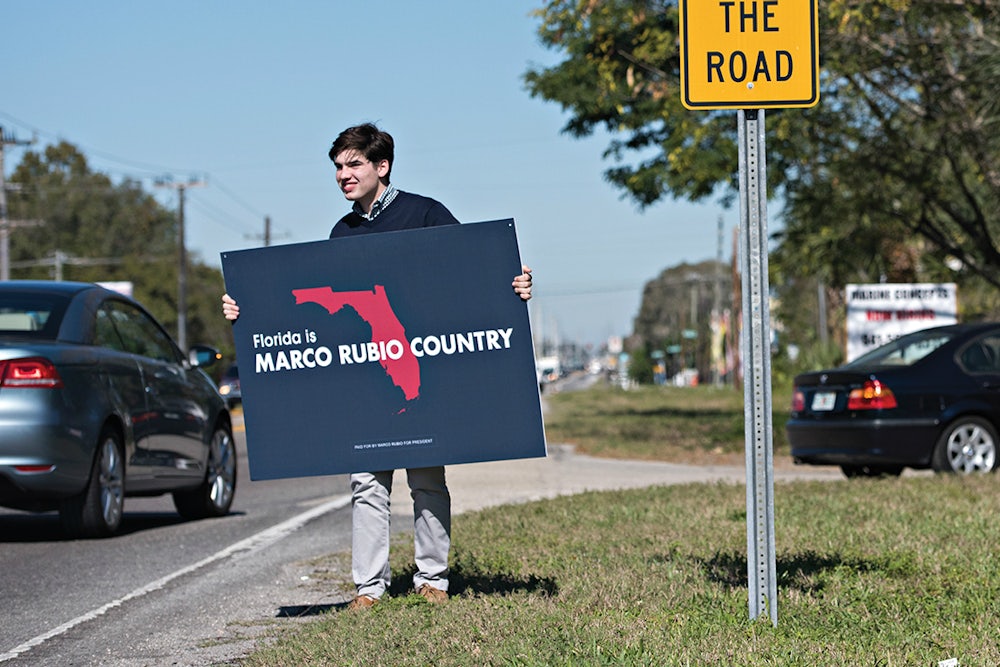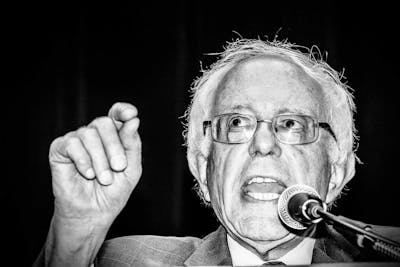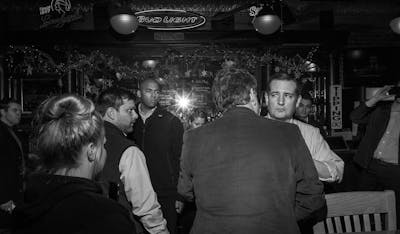Calle Ocho, Miami
The honking noise was getting closer. On a Saturday morning in mid-January, it was 70 degrees at Versailles, and the outdoor counter was packed as usual with men, young and old, coupled and single, sipping café cortadito, a Cuban espresso. The coffee, to me, tasted like any other, but the ambience was killer: Cutting across Little Havana, the main drag of Calle Ocho is lined with palm trees, dollar stores, cigar shops, beauty salons, Cuban bakeries, and botánicas that sell the ritual items for Santeria and voodoo; its storefronts are marked with brightly painted roosters, emblems of power and strength in Cuba. The inevitable sound here is that of spoken Spanish, and the beats of salsa drift in from one of many eateries. The street made me think of the tattered images of Fidel Castro and Che Guevara in their military jackets and berets, the dancing scenes from the Buena Vista Social Club, and at this particular time in American history, two Hispanic-American Republican candidates, both of Cuban-born parents, both up for the job of the president of the United States.
The noise was a road rally of twelve cars that had been slowly
circling the streets of Miami, honking nonstop and blaring speeches from a
truck carrying a speaker, much the way soccer fans do after a victory in some
Latin countries. The voice was familiar to me by now—a clear monotone, always a
bit in a hurry—that of Marco Rubio announcing his candidacy: “Now the time has
come for our generation to lead the way toward a new American century,”
invoking the failed neocon think tank from the George W. Bush era. The cars
made their way down the street, “Rubio 2016” written across the windows,
covered with signs, head shots, and slogans: Marco Rubio por un Futuro
Mejor!
The customers at Versailles, however, seemed to take no notice, as though they were used to such disruptions. When I asked one of the men if he knew about today’s rally for Rubio, he shrugged and shook his head. Another man said, “Oh Rubio, don’t like him much. He gave up South Florida issues to become the speaker of the House. He gave up Florida. Rubio’s for Rubio.” Then both went back to drinking their coffee on this calm morning in Little Havana, just less than three weeks left until the Iowa caucus, as the caravan of cars pulled up to the café.
Peter Garcia, a high school buddy of Marco Rubio, leaned over from the driver’s seat to open the back door. In the back of the truck, Angel Posada, the man in charge of the speaker, hollered cheerfully, “Hop in now!” At about five feet seven inches, barrel-chested, the 36-year-old law-enforcement officer had been moonlighting as an organizer for the Facebook group Marco’s Hometown for America, which he started last year when he learned that a guy from his high school who lived down the street was now running for president. I had met Angel at an event for Rubio a few days earlier, and he had invited me along for the group’s first ever road rally. Angel said he was too young to have known Marco at South Miami Senior High, but he’d known Jeanette Dousdebes, Marco’s on-and-off girlfriend, now his wife. They came from similar family backgrounds: Angel’s father drove an ice cream truck, Marco’s father was a bartender; Angel’s mother worked in retail, Marco’s mother was a maid.
Tucking away his copy of Bill O’Reilly’s Killing Jesus by the cup holder, Peter announced, “We are going to roast a pig in La Caja China in the White House!” Next to Peter was Sandra Posada, older sister to Angel, also from South Miami Senior High. As we drove, Sandra told me about a rainy day in gym class when Marco was 15 and she was 16; they took shelter inside a classroom because the exercise that had been scheduled outside was canceled, and while they were waiting around, Marco stood up to tell a small group of friends that he would one day become the president of the United States. Sandra told me she’d said to him: “When that time comes, Marco, if what you believe is similar to what I believe, I will help you!” Twenty-nine years later, here she was, 45 and disabled, waving a Rubio banner. What were those things you both believed then? I asked. “Pro-life. Immigration restriction. National security,” she answered.
Palm Beach to Miami
I saw Marco Rubio for the first time a few days earlier at a rally at the InterContinental Hotel in downtown Miami. He’d just finished an afternoon fund-raiser at the home of Bridget and Bill Koch on “Billionaire’s Row,” a stretch of beachfront estates on South Ocean Boulevard an hour north in Palm Beach. This area is also the location of residences for two other candidates angling for the Republican nomination, Ben Carson and Donald Trump, who flipped one mansion for $95 million and converted his 1927 Mar-a-Lago estate into a private club with a $100,000 initiation fee. Florida is a tax haven: There are no individual income, estate, or capital gains taxes. Perhaps that explains why the top 1 percent flock to Palm Beach to buy up real estate, but tax dodging becomes more dubious when it involves presidential hopefuls. One long-time Palm Beach resident who once worked for Carly Fiorina sold his house to Ann Coulter and moved next door to Trump. He told me his new house should have come with a Mar-a-Lago membership, so coveted within this exclusive community, but the seller refused to part with it.
If these were the sort of people Rubio was rubbing shoulders with earlier in the day, there was no hint of it that evening in the InterContinental’s event room. About 200 people were waiting for the candidate, mingling and exchanging greetings as a perky Latin band performed on a stage decorated with campaign signs. The middle-aged crowd looked to be mostly Cuban; a couple of local Cuban-American politicians were there, as well as Spanish-language media. The women were immaculately made up in colorful tight dresses with high heels, and men wore suits. It felt like a party, one that was distinctly for Miami locals, and there was an excitement in the air. Then the room fell quiet and everyone’s gaze focused on the man in a dark suit and a tie who had appeared, finally, from the side curtain by the stage, and for a very brief moment, it did feel as though I were witnessing the arrival of a star.
In person, the “Cuban Alex P. Keaton” comparison holds up only up to a point. The cocky, profoundly arrogant Family Ties character was an Ivy League–aspiring yuppie obsessed with money and Ronald Reagan; Rubio, on the other hand, barely finished high school with a minimum GPA of 2.1, jumping through three different colleges in two states. With his neatly parted hair and perpetually pursed lips, he fits the picture of a Young Republican, but he lacks the expected bookish charm, and at 44 years of age, just five months younger than Ted Cruz, he isn’t as fresh and baby-faced as his campaign would like you to believe. Rubio always appears somewhat wooden, like a Stepford Wife, never veering off the script, as though he were hiding a secret that isn’t all that fascinating. With his thickening middle and average height, Rubio’s jock past is difficult to spot now, except for a personal resumé blessed with a surplus of former cheerleaders, including his sister, his sister-in-law, and his wife, Jeanette, a former Miami Dolphins cheerleader and bank teller and the daughter of Colombian immigrants. On stage, following an introduction by a member of the popular reality-TV show, Pawn Stars, Rubio opened his speech with a couple of lines in Spanish, then switched to English to thank Angel Posada and his group for their support.
As is the case with any young, ambitious politician, Rubio has climbed the ladder with admirable single-mindedness and luck. Soon after getting his law degree, he got a part-time job as a West Miami city commissioner, then less than two years later, he moved up to serve eight years in the Florida House of Representatives, first as a whip, then as majority leader and speaker, until he won a U.S. Senate seat in 2010. His entire adult life has been spent in politics, first courting the local Cuban political bigwigs, then moving on to the national base. It was a fast rise, but one would expect nothing less from anyone who would fancy himself one of the youngest presidents of the United States.
“Rubio’s much more of a Tallahassee person than a Florida person,” said Carl Hiaasen, a Miami Herald columnist and novelist, who, when I reached him by phone, was in the middle of finishing his latest book. “As a young person, he started out as a legislator. The culture of Tallahassee is political wheeling and dealing. The capital is there because it’s so isolated and distant from the rest of the state. Not many flights come in and out. They drop into that bubble, and they think they can get away with anything. There’s no Florida in him.”
But the signs in the crowd were insistent: “Florida is Marco Rubio Country.” After following Rubio for weeks, studying him from all angles, I had expected some sort of revelation, as though I might look into this candidate beyond the manufactured image of an all-American boy next door—the Hispanic Ken Doll edition—and see through his politically obscured soul. But he looked exactly as he did on TV, sounded exactly as he did during debates. He appealed to nationalism, shadowed by a threat, with his often-repeated line, “America is a great nation in decline.” He talked of national security, and how he would give terrorists who snuck into our country disguised as immigrants “a one-way ticket to Guantánamo Bay.”
Rubio finished his speech with a smile, and then said the first thing that sounded like it hadn’t been pre-written: “I’m not going to see you until March because I will be really busy where people don’t know me as well as they do here, but I will be back.” I felt a tiny lifting of tension. For a fleeting second, I thought I saw the vulnerability of a candidate and the weight of the campaign ahead, the upcoming caucuses and primaries in Iowa and New Hampshire, which suggested to me that perhaps Florida was Marco Rubio’s country, to Marco Rubio, if no one else. Like a soldier about to ship out for battle, leaving his wife and four children here in sun-kissed Miami, he quickly gathered his strength, waving goodbye with his signature curtness: “I need you. God bless you.”
Sarasota
Crossing the Sunshine State along Florida State Road 70 from West Palm Beach to Sarasota, where I hoped to attend a Rubio town hall at a boat factory, I was struck by how rural the inland feels compared to the condo-drenched coasts. Occasionally, a white egret swooped over the swampy fields that expand into the horizon. 70 is a good road, used mostly by truckers who transport oranges, grapefruits, tomatoes, and sugarcane; Florida is the country’s second-largest producer of fruits and vegetables. The highway skirts around Lake Okeechobee, the second-largest freshwater lake in the lower 48 states, covering 730 square miles, a lifeline for a region that survives on agriculture. Tourists don’t come this way; the highway is surrounded by Seminole reservations, farmland, and dairy farms—I saw cows in black, white, and brown against the golden haystacks and weathered palm trees. Despite sunny days, the Florida winter, on the whole, has been colder than usual, averaging in the low 50s due to an irregular weather pattern caused by El Niño. During hot summer afternoons, it is not unusual to spot alligators on the side of the road, although they are more easily found further south, in the Everglades. Gator meat is popular around here—a West Palm Beach Uber driver told me he also worked part-time as a hunter, trapping and skinning alligators and selling the meat to restaurants. On this long, straight stretch of road, I noticed a repeating sight: gun shops, as common as 7-Elevens.
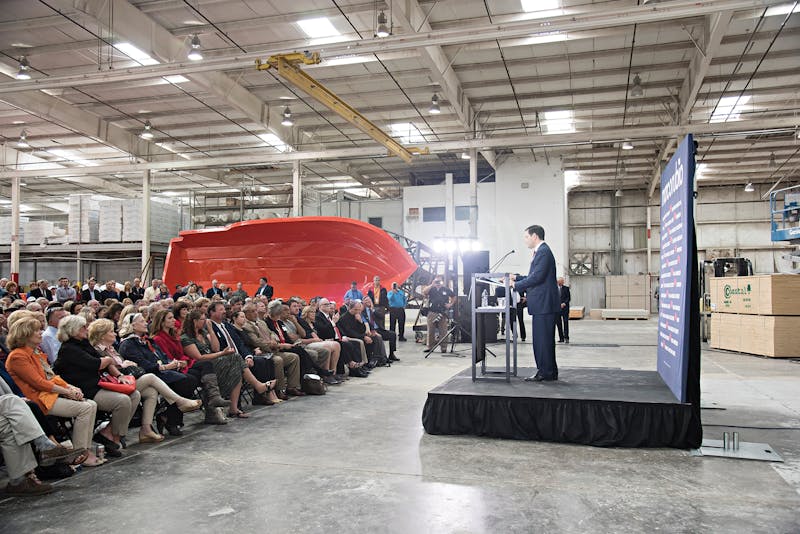
It was at one such store that Marco Rubio bought a gun on Christmas Eve last year. “If ISIS were to visit us or our communities at any moment,” he explained, the gun he purchased would provide the “last line of defense between ISIS and my family.” He was clearly invoking the San Bernardino terrorist attack, which had taken place earlier that month in a quiet California suburb much like his own West Miami neighborhood, where he lives a few blocks from his mother and aunt. Rubio had claimed the gun shop was packed on Christmas Eve because Americans were in fear of Obama taking away their firearms and violating the Second Amendment. The last time Rubio bought a gun was during his 2010 Senate campaign.
I stopped at a gas station near Indiantown. A middle-aged white man with a mustache standing near his pickup truck told me Rubio was the only candidate who made sense to him because of immigration. “Rubio would put them to work, legalize them. The work around here isn’t the kind that Americans are willing to do. Trump’s talking nonsense. If he rounded up these people and sent them back home, who would do the work?” The “work” he referred to is how the oranges and tomatoes traveling along 70 ended up packaged on the shelves of Wal-Mart and Whole Foods; Florida has the country’s third-largest concentration of illegal immigrants, and a majority are undocumented workers of Mexican, Haitian, and Colombian origins. Some of these immigrants work for as little as $5 an hour, and are often subject to working conditions that have been likened to modern-day slavery, including physical beatings and sexual harassment.
It is these workers, and their desperate situation, that Rubio brings to mind in his speeches: “My father was an immigrant. My mother was an immigrant. My grandparents are immigrants ... all of my neighbors are immigrants ... I know this issue: I know the good, the bad, the ugly. I know the story of people who are here illegally and it would break your heart. And I know the people that are here legally, and their story would boil your blood, because they take advantage of us.”
This is the part of Rubio’s rhetoric that makes me alert—almost as a survival instinct. I came to America from South Korea at 13, following my father, an illegal immigrant to the U.S. who became a naturalized citizen through amnesty. During those early years in America, when I spoke no English, I lived in fear some big bully would kick me out for not belonging. I was constantly aware my Resident Alien card hardly provided me with the entitlement of an American birth. My 72-year-old father still doesn’t speak English well, having come so far from his homeland nearly half of his life ago, and having labored seven days a week within the Korean immigrant ghetto for decades. He remains grateful to this adopted home for taking him in and giving him a chance to provide for his family, and I, as his child, the fruit of his painful Americanization, more than made up for it by having arrived at this point of sharing with you, the readers, my reflections on what makes a man worthy of becoming our president. This drive for success and fairness, I always thought, was at the heart of America, a unique ability to self-examine both as insiders and outsiders. Isn’t this, in a way, the story of all Americans, be it Donald Trump or Bernie Sanders? Perhaps, I am beginning to sound like Rubio myself, invoking the hardworking past of our parents who sacrificed themselves, whose sons and daughters strove to realize the American dream. But what is Rubio’s dream for America?
Immigration has become a sore subject for Rubio. In 2010, during his Senate campaign, Rubio claimed: “I am strongly against amnesty … I will never support any effort to grant blanket legalization, amnesty to folks who have entered, stayed in this country illegally.” Rubio won the Senate seat on an anti-amnesty ticket with Tea Party support. Once he reached his goal, however, he did a 180-degree turnabout to sign the bipartisan Immigration Reform bill of 2013, which he has now again renounced. At nearly every speech I have attended Rubio reacts like a robot with a remote button activated where the connecting code word for immigration seems to be “ISIS.” In Miami he said: “You know what this issue’s about more than anything else? It’s about national security. ISIS is trying to use our immigration system against us.”
On arrival, Sarasota struck me as Florida’s version of the Hamptons, manicured with sparkling beachfront condos and yacht clubs, and residents who are perennially ageless: blond hair and white teeth, the way Christie Brinkley looks. Indeed, Sarasota County is one of the whitest regions in Florida, about 90 percent Caucasian. This was no Miami, and it was definitely not Rubio’s country.
The boat factory was a cavernous space, and on the small stage, Rubio began with a joke I’d heard back in Miami: “The only people that thought I could win all lived in my house,” he paused, then delivered the punch line. “Four of them were under the age of ten.” It must be challenging to be a candidate on a campaign, having to repeat oneself with each new audience and appear earnest each time, but Rubio displayed an uncanny ability for verbatim memorization. He would have a “Rubio-Bot” moment at a New Hampshire debate in February, when he repeated an identical phrase four times (“This fiction that Barack Obama doesn’t know what he’s doing ... he knows exactly what he’s doing”) even as Chris Christie attacked him for repeating scripted lines.
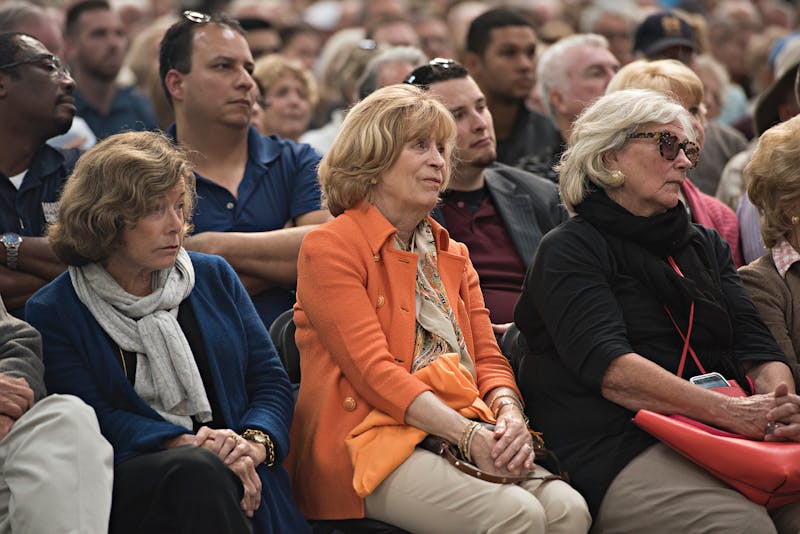
Facing the audience of about 500—nearly all white and middle-aged—he was there to talk about the economy, how the American dream was dying, and how he would restore it by “re-embracing free enterprise.” He said his “free market reform” was about “pro-growth” and “pro-family,” and he would achieve this through his tax reforms. As far as I could understand, most of it seemed to circle back to his inevitable lines about repealing Obamacare and shredding “every single one of Barack Obama’s job-killing executive orders.”
During his 23-minute speech, Rubio did not once break into Spanish
as he so smoothly did in Miami, and afterward, as the press rushed to question
him, Rubio ignored the ten or so Spanish-language reporters. Perhaps this had
something to do with his long-running feud with Univision, the most popular
Spanish-language media outlet in the country, and one of the first to break
open Rubio’s vague connection to the Tabraue drug ring, for which Rubio’s
cocaine-dealing brother-in-law served twelve years. A reporter from
Entravision, the largest affiliate of Univision, tried repeatedly to flag him
down, “Una pregunta por favor.” Finally, she turned away, and said
loudly, in English, to whoever would listen, “Well, he’s not getting our
votes!”
Debate Party
In the back room at Famous Dave’s, a BBQ chain with a location in suburban Miami, the tables were covered with plates of barbecued meat, corn on the cob, and beer for a party to watch the sixth Republican debate on big screen. Two weeks before the Iowa caucus, seven candidates had been invited to the main stage by Fox Business News: Donald Trump, Ben Carson, Marco Rubio, Jeb Bush, Ted Cruz, Chris Christie, and John Kasich.
Everyone watching the debate seemed to be Cuban. Angel Posada moved from table to a table, greeting each person— many were part of Marco’s Hometown for America. A few pulled out their phones, took pictures, and began uploading them to Facebook. When Angel saw me his face brightened and he waved me over saying there were quite a few of them there tonight, Marco’s old friends from high school.
South Miami High has 2,200 students, it is 88 percent Hispanic, and about 90 percent of those students are of Cuban origin. Both the principal and two assistant principals are Cuban, and they told me that the ratio was about the same when Rubio graduated in 1989. According to Peter Garcia, there were seven in his group of friends, all Cuban, who congregated in front of the orange-colored lockers by the gymnasium. One of those friends, Miguel Moya, who later would serve as the best man at Rubio’s 1998 wedding at Church of the Little Flower in Coral Gables, where the groom sang a Frank Sinatra song for the bride, told me, “Back in high school, you were popular if you had a beeper, a car. I had a white Buick. I knew Marco’s little sister Veronica since I was 14, so I would pick her up on the way to the school, and Marco as well, that’s how we became fast friends.” At lunchtime, the group hung out at a pizzeria outside the school building. Jeanette and her friends would be there too— Marco and Jeanette were “courting” at the time, Peter said—but Marco didn’t take her to the senior prom at Fontainebleau Miami Beach hotel.
On hot afternoons, the friends would head off to Tropical Park, either to swing off a rope for lake diving, or race up and down the small hills to build endurance in their legs for football. Sometimes an ice cream truck was parked nearby; Marco’s favorite was the screwball orange kind with gum in the bottom that you eat with a wooden spoon. Or they would pile into Miguel’s car to go to Castle Park, a local amusement park, to play arcade games and race go-karts. When a new TV show called Miami Vice posted a call for extras, they all jumped at the chance to be on television—only Marco thought it was a waste of time. Sometimes, some of the group would drop by to visit Peter’s older cousin, Enrique “Kiki” Garcia, whose band had a new name, Miami Sound Machine, and they marveled when a song he wrote, “Conga,” reached number ten on the Billboard chart.
The picture of this Cuban Afterschool Special was so endearing I nearly forgot where I was when suddenly I heard laughter all around me. On TV, there was Trump pointing at Cruz, “Who the hell knows if you can even serve in office?” Trump began to dig into Cruz’s Canadian birth record, and Cruz shot back, “I’m not going to be taking legal advice from Donald Trump,” which caused another burst of laughter. Rubio, with a perfect timing, interjected. “I hate to interrupt this episode of Court TV.” The restaurant broke into applause.
One of the youngest people in the room was 19-year-old Ray Anthony, a third-generation Cuban and one of Rubio’s students when the Senator taught a class on Florida politics at Florida International University. “I thought because Marco’s a senator, he would be pretentious, but he was just one of us. He drove his own F-150 pickup truck to the class, and you could walk with him to his car and talk the whole time. Hillary hasn’t driven her own car for the last 20 years. Marco’s like all of us, a son of immigrants.”
This “son of immigrants” tagline, however, is more loaded than it sounds. Although his mother returned repeatedly to Cuba, Rubio himself has never visited the country. Until he was called out by the Washington Post in 2011, Rubio campaigned by describing himself as “a son of exiles,” which turned out not to be the case—his parents voluntarily immigrated in 1956, two years before Castro’s takeover.
To call Rubio a “Hispanic candidate” suggests he would draw Hispanic votes, much needed for his Republican Party, but this is misleading—the rest of the Hispanic community doesn’t exactly embrace the Cuban population. Cubans have faced a different set of immigration standards than other Hispanic arrivals to the United States. In 1966, the Cuban Adjustment Act gave blanket amnesty to Cubans living in the country for more than a year. One such beneficiary was Rubio’s maternal grandfather, Pedro Victor Garcia, who had immigrated to the States in the same year as Rubio’s parents but moved back to Cuba in 1959 to work for the Castro regime, only to return to Miami a few years later, entering as an illegal immigrant and eventually becoming legalized in 1967.
The older generation of Cubans tends to vote Republican, still reeling from the betrayal of Kennedy’s botched mission at the Bay of Pigs, an opinion shared by some in the next generation, including Angel Posada. “My father came over in 1959. Eisenhower took us in, and Kennedy sold us out. That’s why I don’t like Democrats.” Yet it was Obama who carried Florida in both recent elections, sweeping the majority of the Cuban votes in 2012. Young Cubans may be moving away from the bitterness of the past.
Assimilation, however, was nowhere to be found among those in the room that evening. The biggest boo came when Cruz said, “What we need is a commander-in-chief who is focused like a laser on keeping this country safe.” The crowd shouted out in unison, “It’s not you!” Sandra and Peter began arguing about whether Cruz even spoke any Spanish. Sitting nearby, a Navy man–turned–loan consultant from Coral Gables, snapped, “There are only two Hispanics in this race, and it’s Jeb and Marco.”
Everyone agreed Rubio had clearly won the debate, especially in the way he stuck to the serious topics, despite the silly banter between front-runners Trump and Cruz. On screen, the pundits from Fox Business News, seemed to agree that Rubio’s modest aspiration to third place in Iowa was in reach—popular opinion was that neither Trump nor Cruz was electable, and Rubio was waiting around for their self-destruction.
When the evening ended, and the happy crowd was waving goodbye, making plans for the next Rubio rally, it occurred to me that during the heated discussions on immigration, no candidate, including Rubio, brought up the special privileges that only Cubans enjoy.
I asked Hiaasen what he thought about the Florida electorate and Rubio’s Cuban identity. “His family has an immigrant story, but you can’t frame that in context of immigrant regulations. All other sets of refugees wash up on the shore of Florida, go to detention, but the experience of Cuban exile is like no other. You get to the shoreline, you are in. On one hand, it’s a humane policy, but it’s totally unfair to other immigrants who suffer much more extreme poverty and sickness. But no politician is going to address that. Because Florida is too important, and you need Cuban votes. You are not going to alienate them.”
Florida votes can be a key to winning an election. It is an
essential swing state with 29 electoral votes, and its recent voting history is
split between Democrats and Republicans. Since most of Hiaasen’s 27 books are
set in Florida, I asked him what he thought of the slogan “Florida is Marco
Rubio Country.” Over the phone, he laughed. “I’ve never been there—where is
that? Tell me where that is.”
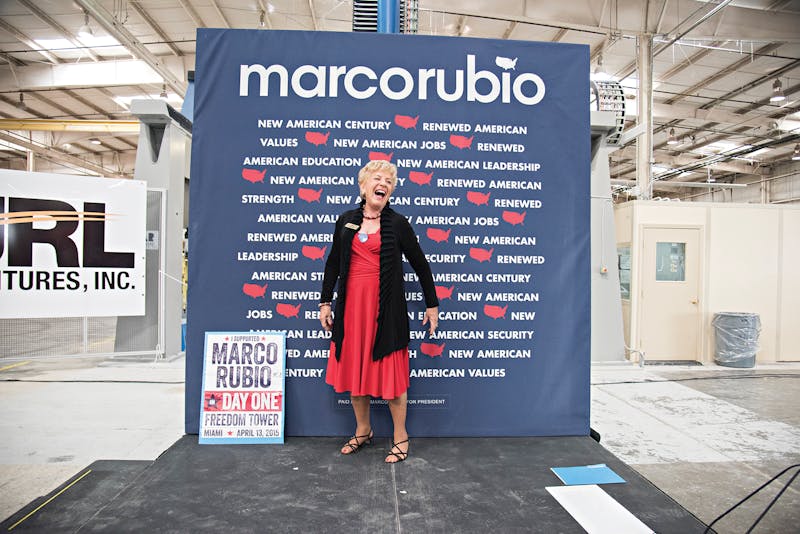
Iowa
As the caucus drew closer, the wind chill in America’s heartland fell to minus 40 and the state was covered in snow. The two-hour-long drive from Cedar Rapids to the rural town of Decorah revealed little to me about Iowa, a place I’d never been, except for the 360 degrees of white fields. Although Florida is the flattest state in the country, the land here seemed unnervingly eternal; the only points that disrupted the horizon were silos and smokestacks. Occasionally, a cascade of smoke smudged the sky, which I later learned was water vapor discharged by nearby ethanol plants. It was a shock how beautiful and lonely a plain landscape could be in dead winter. The crisp chill felt clean, the emptiness brought a sense of serenity, and at moments, it felt as though such quietude would last forever. I closed my eyes, forgetting momentarily the political turmoil beneath this vast landscape.
Ted Cruz would win the caucus. Marco Rubio would come in a close third, behind Donald Trump. But to his supporters, it was in Iowa that Rubio truly began to fight. There was a mantra that some Rubio fans, as well as the media, had been saying for a while now—that Marco Rubio was the only electable Republican candidate.
In late January, however, following his campaign through the icy terrain, I couldn’t predict any of it. At each town, Rubio’s speeches were nearly identical, and the audience at each event was so exclusively white that I felt self-conscious as possibly the only person of color around. Rubio, though, seemed unfazed. He began each event with the same jokes—commenting on how cold it was in Iowa and asking for a ChapStick. (“The wind is killing my tropical lips.”) He would bring up his need for a Cuban coffee, the kind sold at Versailles on Calle Ocho, which he said was five times stronger than the cup he drank that morning.
Then it was business as usual. He lashed out against how Obama had weakened this country and how Hillary Clinton would weaken it even further. He carried on making his tireless points about immigration leading to the infiltration of ISIS, from which he was the only candidate qualified to protect Americans. The only change to the script was the added emphasis on his pro-life beliefs and his faith in God, which he has often called “the single greatest influence in my life.” In fact, his closing remarks during the final Republican debate, just four days before the caucus, began with “the Bible” to appeal to the predominantly evangelical Republican voters of Iowa. Similar to the way he skipped from college to college across state lines, Rubio has done a run of church hopping. Baptized Catholic, then re-baptized at the age of eight in the Church of Jesus Christ of Latter-day Saints, he spent part of his childhood as a fervent Mormon in Las Vegas. He now attends both Catholic Mass on Sundays and worship on Saturday evenings at Christ Fellowship, the country’s tenth-largest evangelical Protestant megachurch.
There was a moment, on the hour-long drive from Decorah to Waverly, where he was scheduled to have a town hall forum at the local country club, when for several miles my car trailed the black van carrying Marco Rubio along the rolling plains. There were no other cars in sight, and it felt like we were, at last, alone together. I wondered if Rubio would look out the tinted window and see this flat country that wasn’t Florida, the landscape he’d so often called “a great nation in decline.”
In Battendorf, there was the biggest crowd I’d seen him draw in Iowa, nearly 700 people. I watched as he shook hands, exchanged small talk, and took photos with each person who wanted one. Instantly, he found something personal to say. To old women, he asked after their health. To middle-aged men, he brought up sports. To veterans, he asked which battalion they fought with. To mothers with children, he inevitably mentioned his own family and how much he missed them. It was so effortless you almost believed he sincerely cared for every last one of them until finally no one was left in the line and I asked him what he would do to relax when he went up to his hotel room; he rolled his eyes, gave a snarky chuckle, and snapped, “Oh there is no relaxing in this.” Before his handlers packed up for the evening, a family of three, a father, a mother, and a daughter, came up to him, and the father asked, “May we pray with you?” Rubio’s eyes lit up as he smiled softly and put his arms around them to lean closer to pray together.
As we drove, I kept losing my focus on the white fields ahead, searching for signs of life, a noise of some kind, perhaps a glimpse of corn that would signal I was in Iowa, but there was nothing but cold air. I thought my search for Rubio was never going to be more than it was then—there was no one waiting for me on the horizon. Rubio is the candidate who can become whatever you want him to be—Catholic or evangelical, for or against immigration, a son of exiles or a son of immigrants—a canvas on which we can paint our own version of the American dream. Before his van sped away, I wondered if Rubio, in the passenger seat, was in fact looking at a reflection of himself.
Little Havana
Before I left Miami, Peter Garcia and I had taken a stroll along Calle Ocho after the road rally, stopping in Domino Park, where Peter used to come with his father as a child. This is one of the tourist attractions in Little Havana, where the old men who had fled Castro’s Cuba gather in afternoons to play the game, smoke cigars and drink cafés cortaditos and mojitos. It almost felt like a relic from a bygone era, and for a moment one had to marvel at how Marco Rubio, or even Ted Cruz, rose from this world. But any sentimental reflection was short-lived as an old man huffed at my mention of Rubio, “He’s no good. Too wishy-washy.” Another domino player winked and told us he had used the honking from the road rally as a distraction to cheat during a game. I asked him if he felt any affinity for the fact that Rubio was Cuban. “We are proud of the boy, but I’m not voting for him. Rubio won’t know what to do with, say, Kim Jong-un, but Trump will. If it’s broken, Trump will fix it.” There was also little love for Cruz. “The other one doesn’t get along with Trump, but Rubio does, so maybe he could be a vice president to Trump.” Peter looked appalled as he turned red and whispered, “I had no idea of this … Marco is in trouble.” The old man continued, “Trump can’t be bought because he has his own money. He has no special interest group. Nobody can buy him. Trump tells it like it is.” And together, the men at the domino tables began shouting loudly for the candidate of their choice, “Trump! Trump! Trump!”
